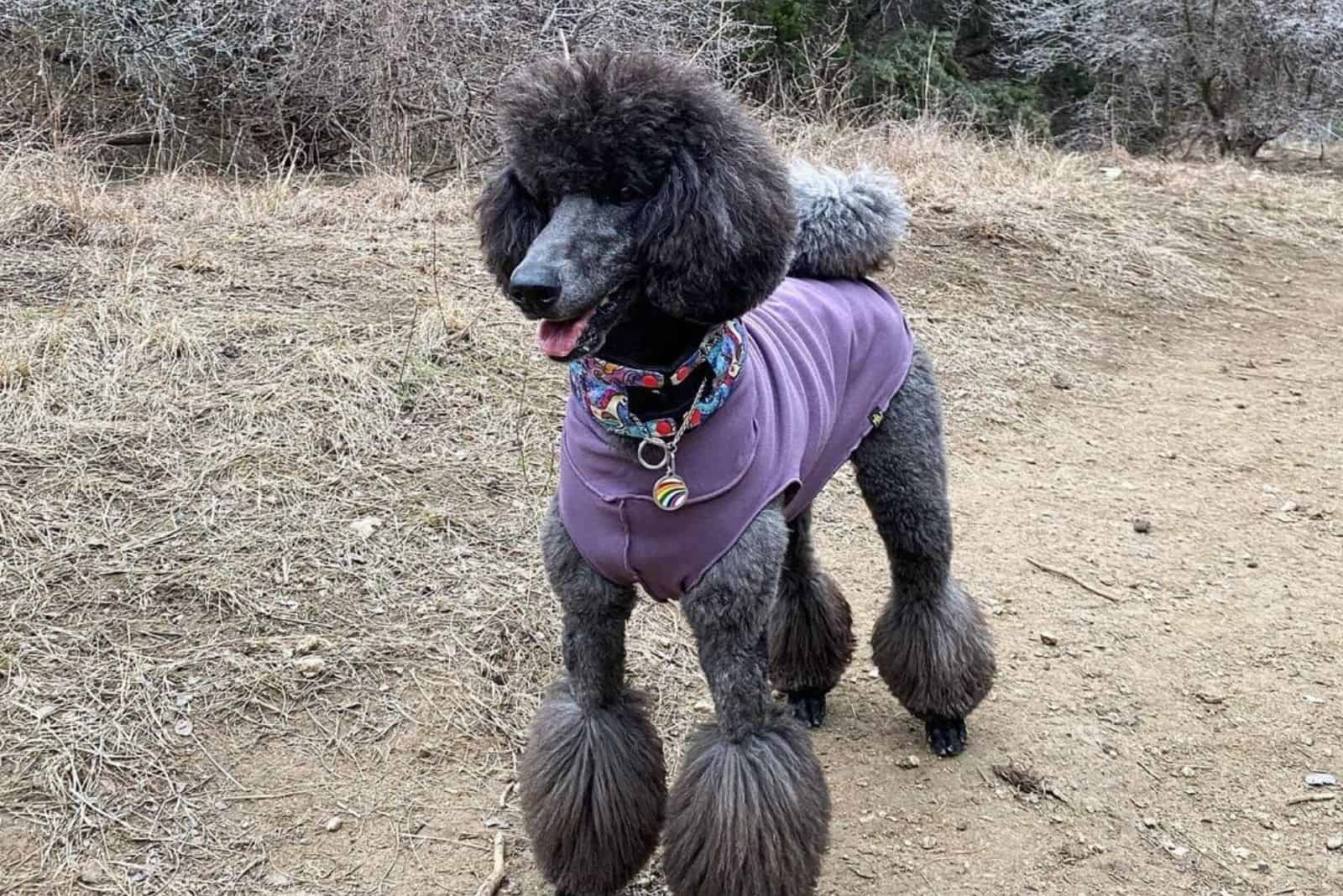Poodles are elegant and graceful dogs. They have a smart expression on their face and a lovely body that makes them appear quite eye-catching. Not all dog breeds come with such an array of wonderful colors, but Poodles do! It’s really hard to pick the prettiest one, but we can all agree that blue Poodles are something special.
But, do you know what these blue Poodles are? How do we get them? Are they really blue, or is it an optical illusion?
Let’s investigate the blue spectrum!
What Are Blue Poodles?
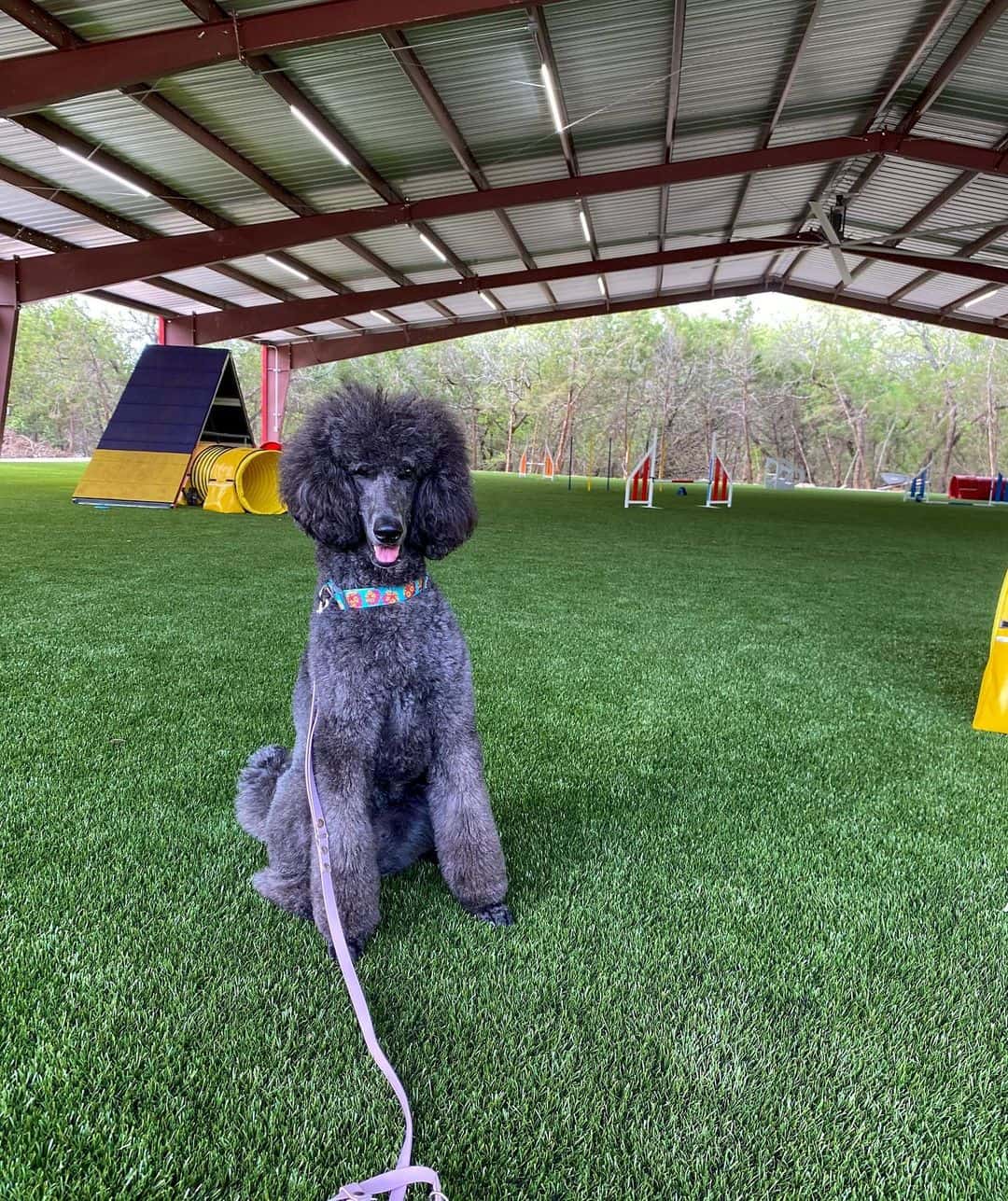
Photo from: @servicepoodlenellie
Many people are surprised to learn that blue Poodles don’t really exist. But, what are those bluish dogs we see in the Poodle family?
Well, let’s make things simple.
Blue Poodles are not purebred Poodles. They’re simply black Poodles with a faded black coat.
This fading is also known as graying out, and it’s quite common in dogs with black coats. Dogs with light-colored coats like white or cream don’t go through this process.
But, this is not a simple subject either. We have to dig deeper and find out what causes these different Poodle coat colors.
The Genetics Behind Poodle Coat Colors
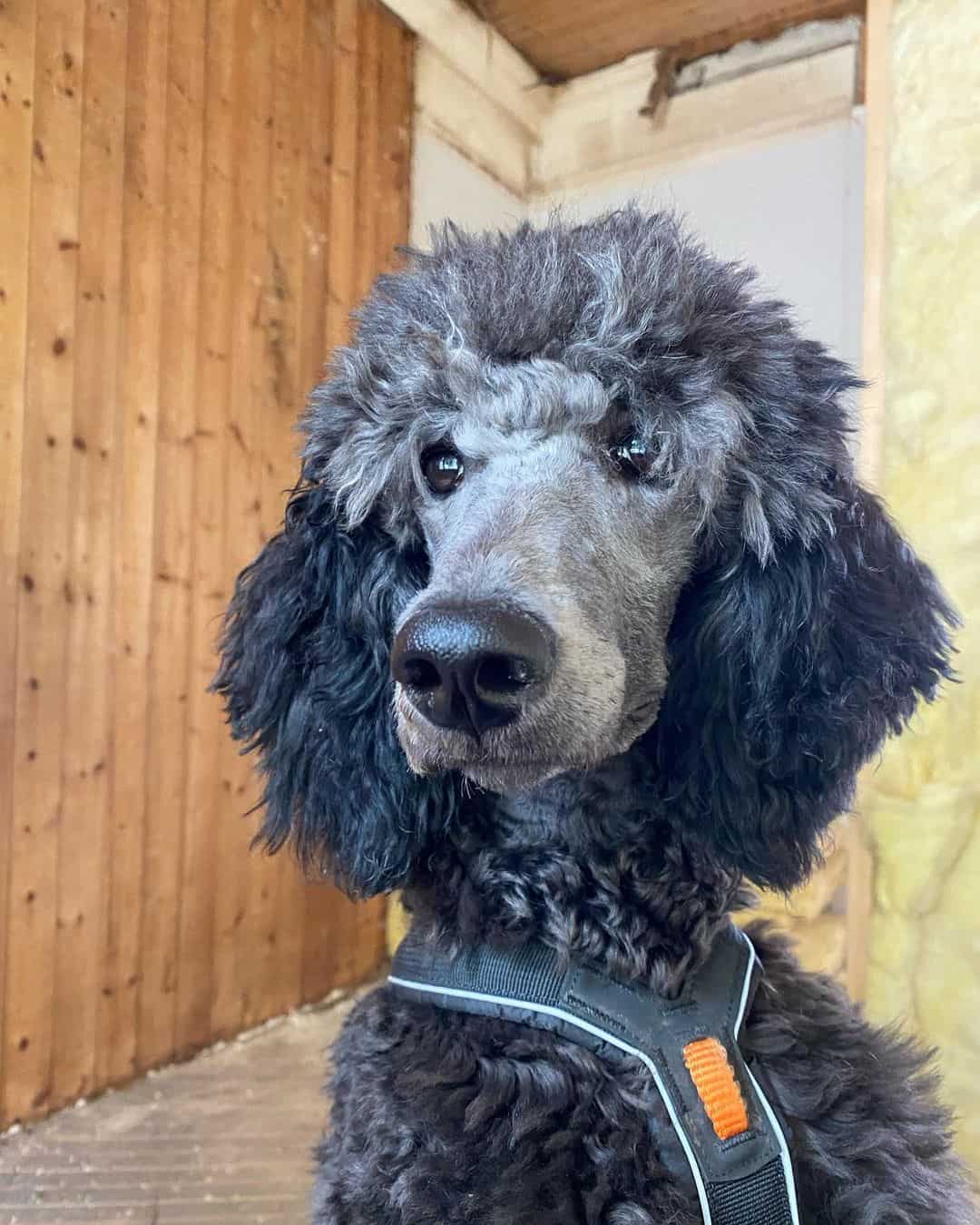
Photo from: @minken.poodle
As the Poodle dog breed became popular, dog owners have shown interest in developing new coat colors. There are many reasons why your Poodle has a specific coat and why your Poodle is unique.
Factors to consider about the genetics of the Poodle’s coat color are the following:
• Color-related genetic risks: Some Poodles carry more inheritable diseases. When you mix coat colors by mixing breeding lines, you dilute the genetic pool and lower the risk of potential health problems.
• The unique red coat gene: The origin of the unique red coat is still unknown, but we suspect it evolved from breeding with red Cocker Spaniels.
• Recessive traits: Recessive traits statistically appear less in breeding. Of all the Poodle colors, apricot is one of the most recessive traits. Even though the color is quite rare, it’s still very popular.
• DNA testing: Experts can run tests to determine whether your Poodle’s coat color is the result of poor breeding and if it signifies a potential health risk.
Skin Color
The coat isn’t the only thing that changes color. The skin changes color too! The most common reason for this change is exposure to sunlight. This happens mostly on the dog’s belly. Seeing a pink belly with dark spots is not unusual at all.
However, any Poodle owner who sees black points or raised spots on the skin should be worried. Your vet should take a look because these spots may be a sign of skin cancer.
Other Poodle Coat Colors
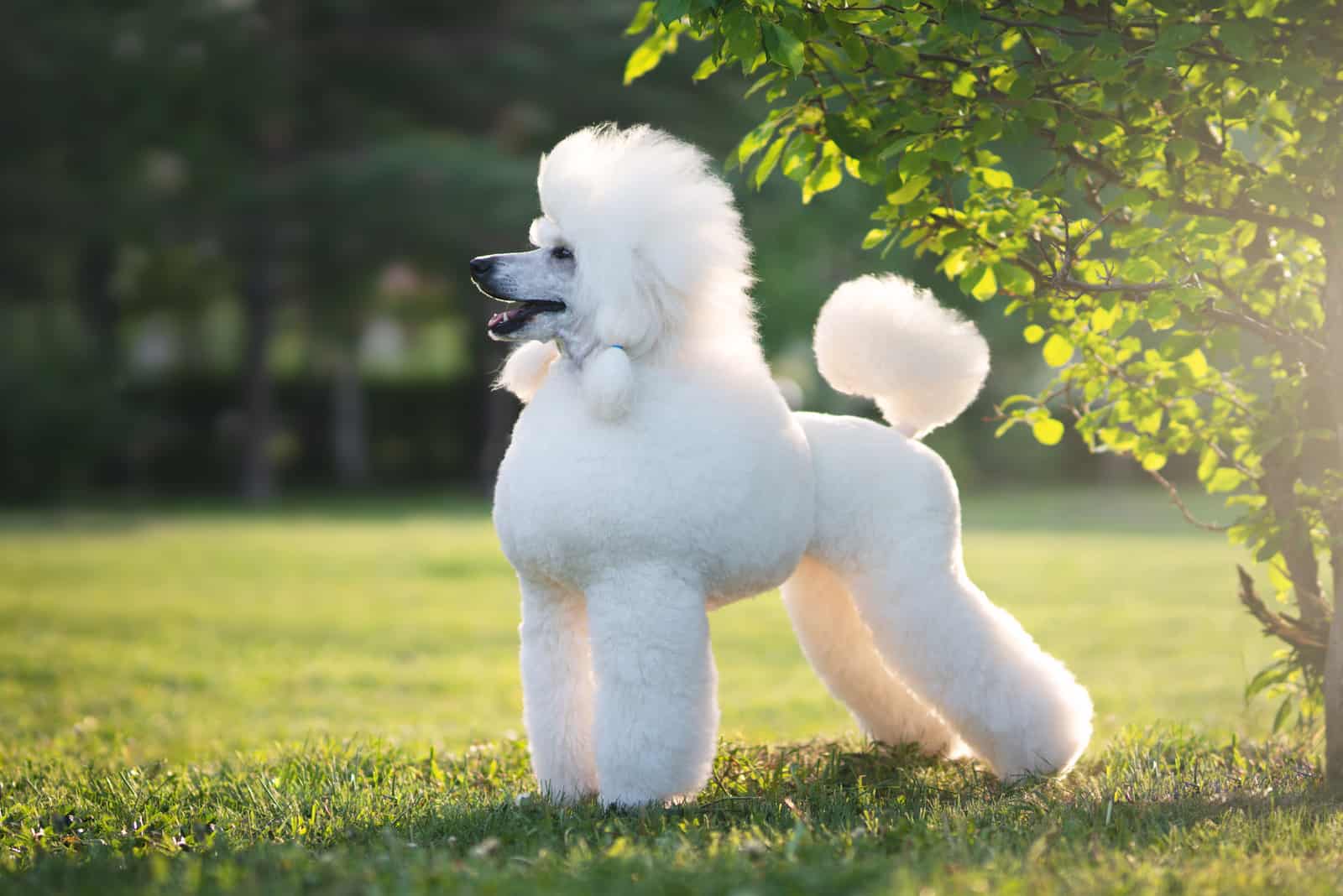
Besides our gorgeous blue shade, Poodles come in 11 other shades, including:
• silver
• grey
• cream
• white Poodle
• brown
• apricot
• cafe au lait
• silver beige Poodle
What’s The Rarest Color Of Poodle?
Apricot poodles are the rarest Poodles of them all. It is caused by a recessive gene. The color comes off as a very light red, almost resembling cream. Apricot is believed to be the last color developed in the Poodle breed.
However, phantom Poodles are pretty rare too. Besides the standard phantom, we consider merle as another rare color.
Poodle Coat Color Changes
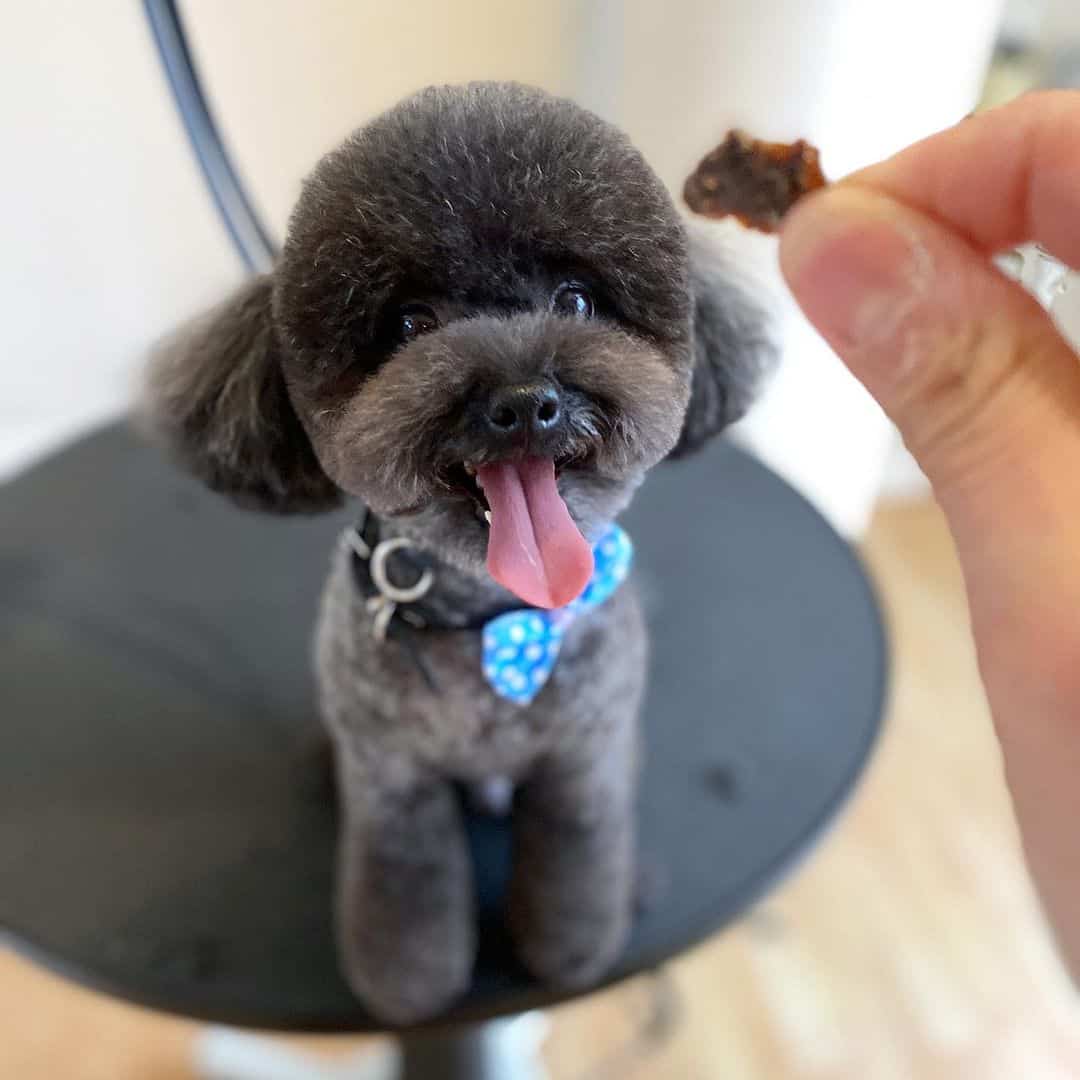
Photo from: @myfavouritedogsalon
When a Poodle puppy is born with a solid color coat, you should be aware of many factors that can affect the coat color change, especially when the dog becomes an adult. If the puppy keeps the same color, it is called holding.
However, many Poodles clear. But, what does this mean? When the coat fades or lightens to another color, it is named a clear. This lightening of the fur doesn’t occur evenly all over the coat. The
Poodle color will often hold more on the dog’s ears and the thicker guard hairs.
Here are a few examples of color change:
• Cafe au lait or tan Poodles are born dark brown and change to a coffee color around 2 years old.
• Blue Poodles are born black and change over by the age of 2 years.
• Silver Poodles are born with black hair and change over by the age of 2 years.
• Apricots are often born a dark color that lightens by the age of 2 years.
Many dog owners can become confused as their Poodle changes color to a completely opposite one than their initial coat color.
Take our true blue Poodle, for example. Blue Poodle puppies are often misinterpreted as black. Experienced breeders should know the difference. If that puppy has parti parents in the bloodline, as the coat clears in the first two years, other colors may appear, and the black puppy who was actually a blue parti will become a parti with a wide array of possible colors.
What Happens When A Poodle Turns Gray?
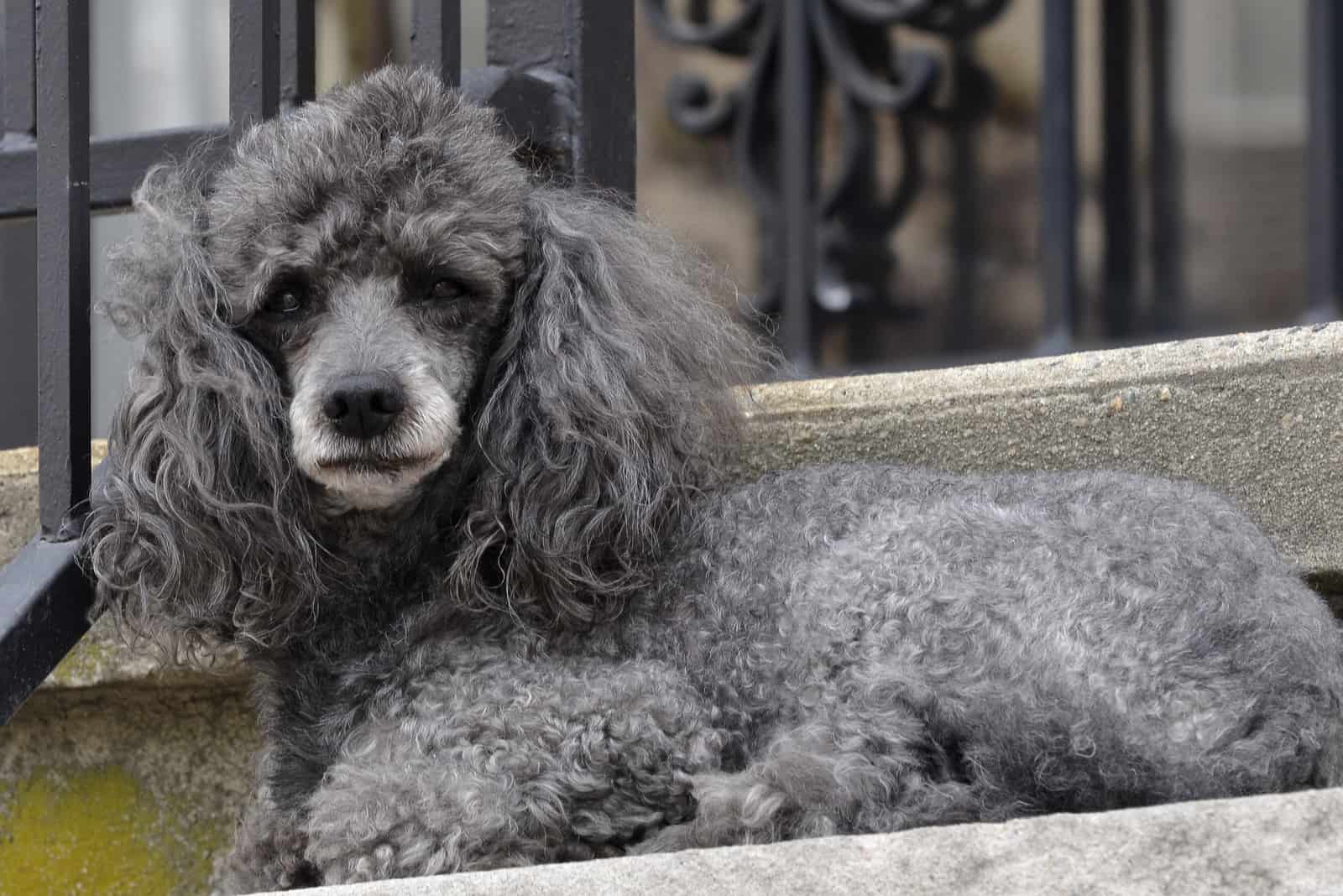
Poodles have a gene called progressive graying on the G locus. When a black, blue, or brown Poodle has the mutation in this gene, they will gradually fade in color as they mature.
But, not all black, blue, or brown Poodles have this gene mutation. Since this is a dominant mutation, if one of the parents experienced progressive graying, there is a 50% chance the puppies will have the mutation too.
The color change will be visible around their second or third month, and it’s usually complete by the time the dog reaches adulthood.
Some dogs even experience small changes throughout their whole lives.
Can Poodles Have Blue Eyes?
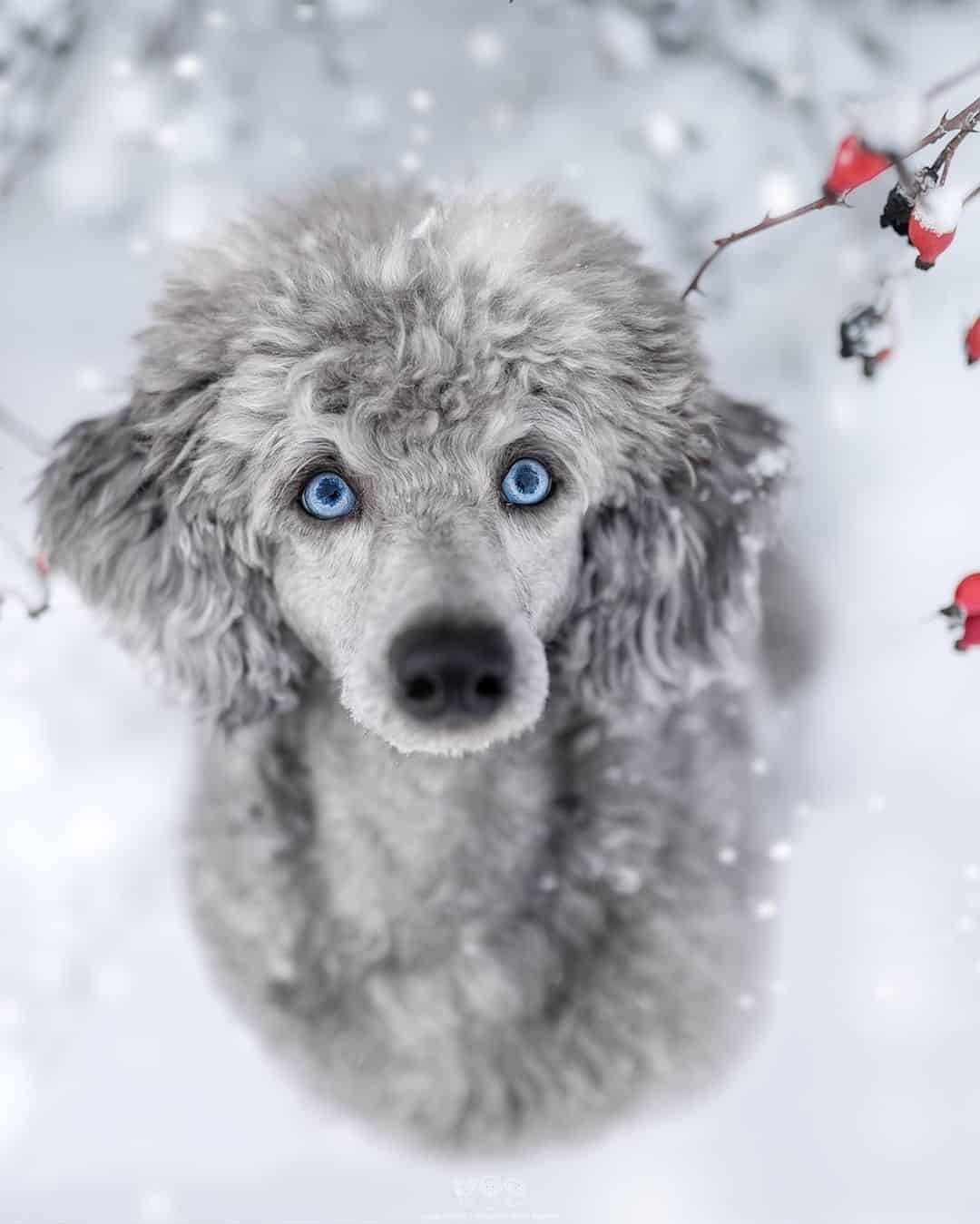
Photo from: @wackelbrueder
So, can Poodles have blue eyes?
The answer is very simple. Yes, Poodles can naturally have blue eyes. However, the American Kennel Club (AKC) doesn’t mention this as a breed standard. Blue eyes can often be a sign of something wrong with the canine, which occurs much more often than a fancy mutation.
In 99% of cases, older Poodles with blue eyes are very ill.
Another fellow canine, the Siberian Husky, is known for its gorgeous icy blues. Blue eyes are a sign of beauty and grace. Huskies with heterochromia are highly desirable. But, that’s not the case with Poodles.
Signs Of Issues
Poodles are a popular dog breed among dog breeders, both reliable ones and those who are not. Illegal breeders use lots of underhanded techniques to breed Poodle puppies. Those techniques often result in genetic issues, health problems, and more in the puppies that you won’t see at first glance.
Blue eyes are usually a clue to such breeding. A Poodle with blue eyes likely has some form of issue, for example eye disease. So, when buying a Poodle, gazing into the puppy’s eyes is a must.
Pigmentation Problems
Here’s where things get tricky. Blue eyes in Poodles are uncommon. They are only an issue if this eye color doesn’t run in the family from birth. Tracing the pups’ bloodline to make sure the blue color is a family gene helps identify whether the eye color is a pigmentation problem or just a family gene.
The Merle Gene
The merle gene is responsible for our gorgeously marked pets. For people only looking for a family dog, the merle gene changing the coat pattern isn’t a big deal. The problems associated with this gene, however, are truly a problem.
The merle gene is commonly associated with deafness, blindness, and physical deformities. A double merle puppy will have a much higher chance of being deaf and blind.
The first indicators of this gene are blue eyes and the merle coat pattern. The only way you can figure out the type of problems you will be facing with a merle Poodle is to look into the bloodline.
Different Standards
If you’re looking for a Poodle to breed and show, then you should look into the dog’s eyes first. The breed standard for these breeds involves dark eyes that are black or dark brown.
Blue-eyed Poodles are a huge no-no from the beginning if you’re looking for a show dog.
What Is A Blue Moyen Poodle?
Moyen Poodle is a French term for the fourth Poodle size. The breed was founded almost five centuries ago in Western Europe.
We all know that the Poodle is an active and intelligent dog that is very elegant and squarely built. Poodles have a moderately rounded skull with a slight and definite stop. The muzzle is long and straight.
The breed standard includes dark, oval-shaped eyes with an alert and smart expression. The ears should fold over to the head, set at or slightly below eye level.
The Poodle breed makes excellent watchdogs but doesn’t serve well as guard dogs. Poodles are easily trainable canines that excel in typical training lessons like potty training as well as obedience training.
But, what about the Moyen Poodle? Are they similar to these breed standards? Absolutely! Moyen Poodles are only smaller in size than the regular Poodle but slightly bigger than the Miniature Poodle.
Blue Poodle Puppies
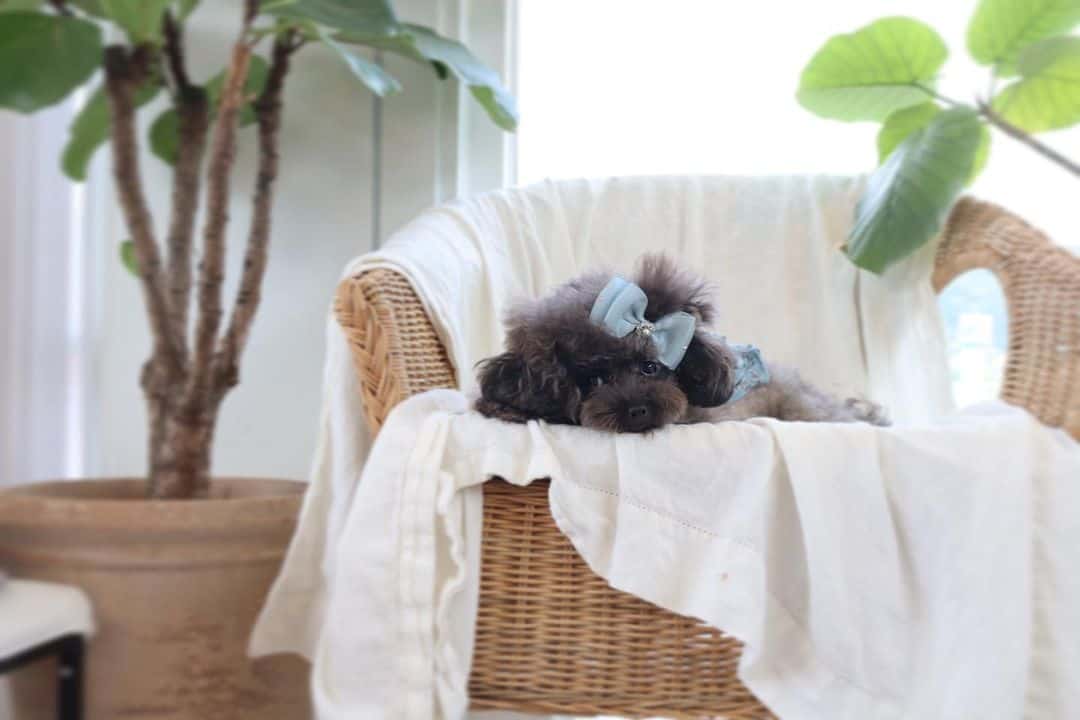
Photo from: @hi_som2xnana
Blue is a deep color, meaning it’s hard to be seen in some lights. This can make your blue Poodle appear black. Many Poodles appear very dark from far away, but once you get closer, you can see their blue tint.
Experienced dog breeders even make mistakes by registering blues as black Poodles. They only notice the mistake once the dog turns several months of age.
So, when picking a blue Poodle out of the litter, it won’t be a bad idea to carry the puppy around and look at it under different lights. The sun may reveal the secret.
What Are The Differences Between A Black Poodle And A Blue Poodle?
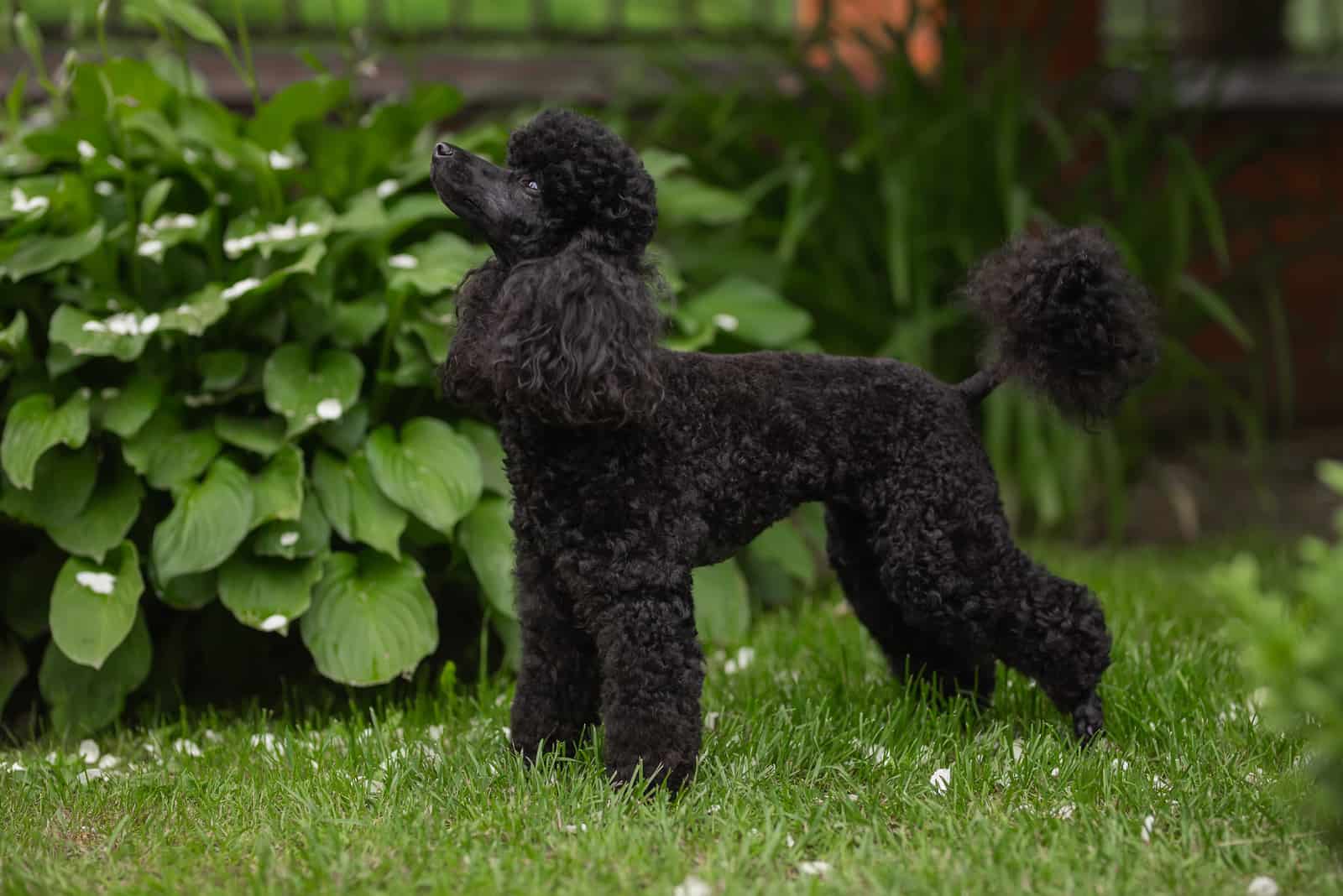
Is there any difference between blue and black Poodles? Of course, there is! But, those differences are much deeper than the eye can see.
Most people believe there are no major differences between the two Poodle colorations, but you may be wondering about the possible similarities between the two. So, how are blue and black Poodles similar? Well, they are similar in pretty much every way.
Both blue Poodles and black Poodles are available in three sizes, toy, miniature, and standard. They both have a lifespan of 12 to 15 years and are vulnerable to the same diseases like bloat, Addison’s disease, thyroid problems, hip dysplasia, and epilepsy.
How Much Do Blue Poodles Cost?
Here’s what you need to know about blue Poodles: they’re not easy to find.
The biggest reason is that reputable breeders don’t sell blue Poodles because people don’t find them desirable. Dog lovers usually prefer the standard Poodle colors like black and white over the blue Poodle.
Since blue Poodles are the result of black Poodles with fading genes, the cost of these blue puppies will be the same as black Poodle puppies. Black Poodles cost around $500 to $2,000.
What Is Unique About The Poodle’s Coat?
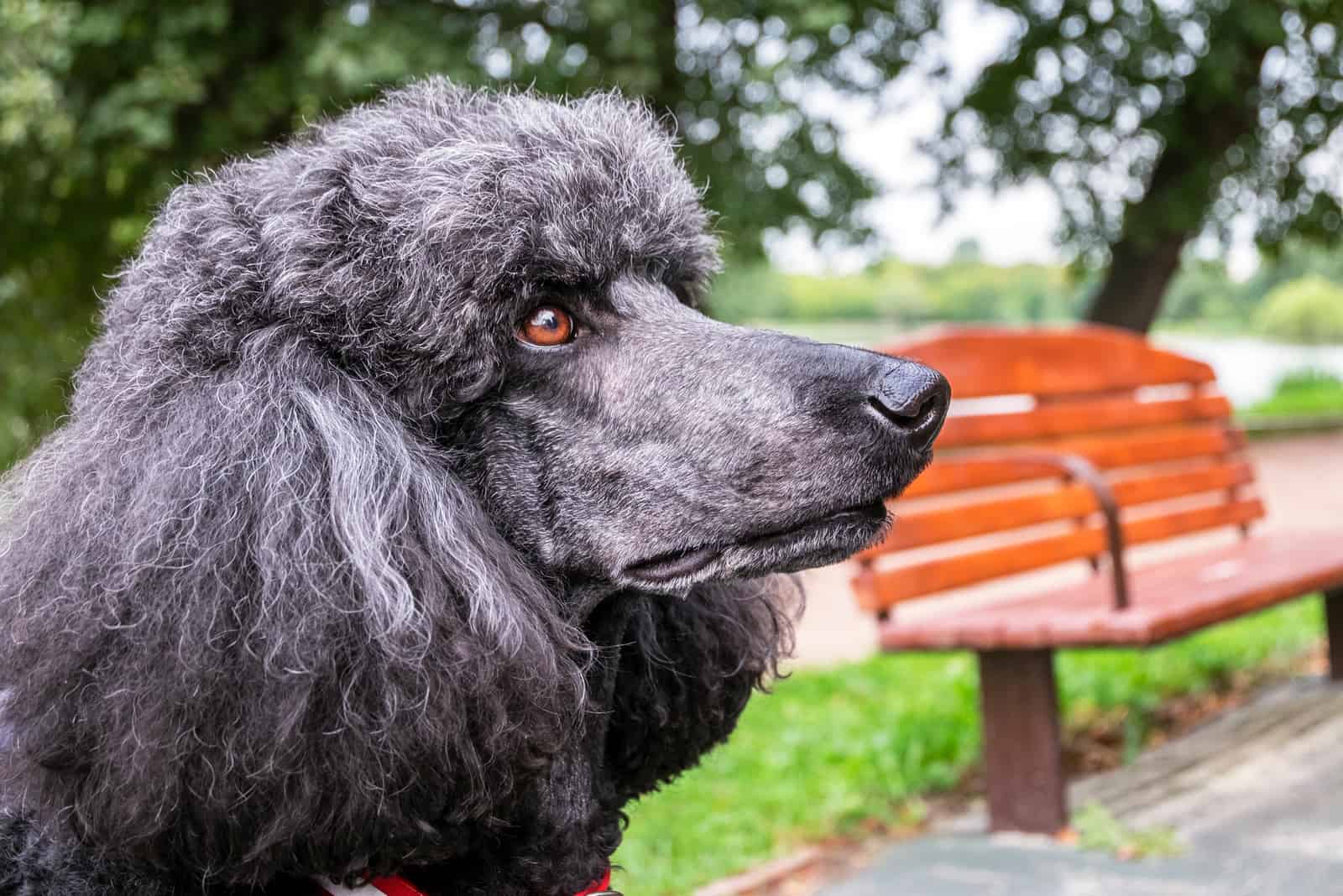
The color and style of a Poodle’s coat are one of the most unique characteristics of the Poodle breed. Numerous distinctive characteristics can contribute to your decision when choosing the right Poodle as your pet.
These distinctive qualities of a Poodle’s coat include:
1. The Texture of a Poodle’s Coat
The Poodle’s coat texture is coarse, thick, and curly. Poodles are known for having soft fur, but only if you blow-dry the coat and brush it regularly. In other words, need a dog for cuddling? Look no more!
2. The Poodle’s Single Coat
While most dogs have double coats prone to shedding, Poodles have a shorter undercoat and a longer outer coat. This can mean that Poodles have a single coat. Their hair growth cycle is longer than dog breeds that sport a double coat.
3. Limited Shedding
Poodles are hypoallergenic dogs. They shed less than most other dog breeds. A Poodle’s single coat means they will shed less throughout the year because they won’t be ridding themselves of an undercoat. They have thick hair, and loose hairs will get caught in the other hairs, making the coat appear non-shedding.
Are Poodle Coats Hypoallergenic?
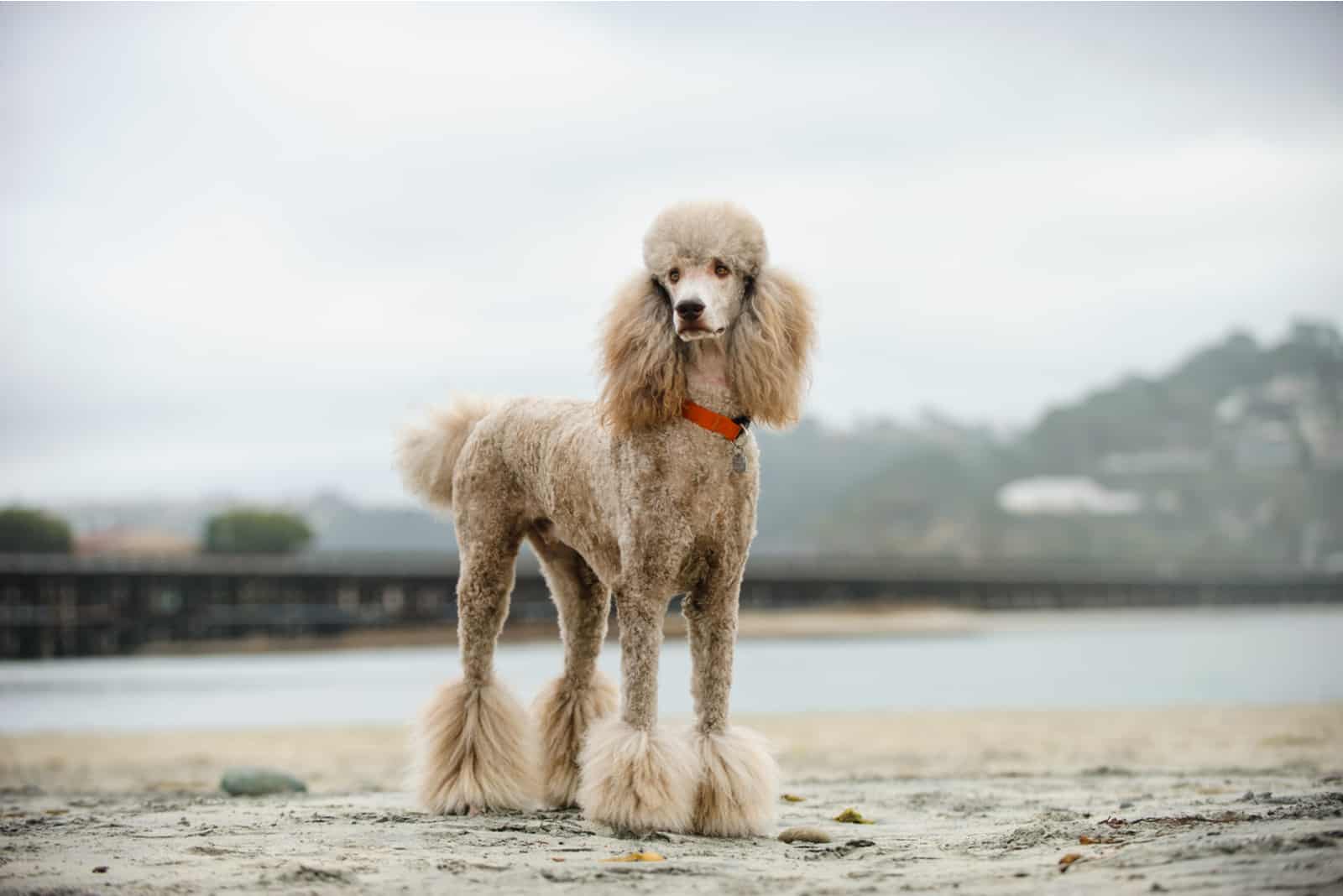
People with pet allergies are often allergic to:
• dander
• saliva
• pet urine
Poodles have single coats, resulting in a lower level of shedding. Less shedding combined with thick hair means that poodles have less dander than your average pooch. But, still, Poodles can produce allergens, but they’re better for people prone to allergies.
Health Problems With Poodle Coats
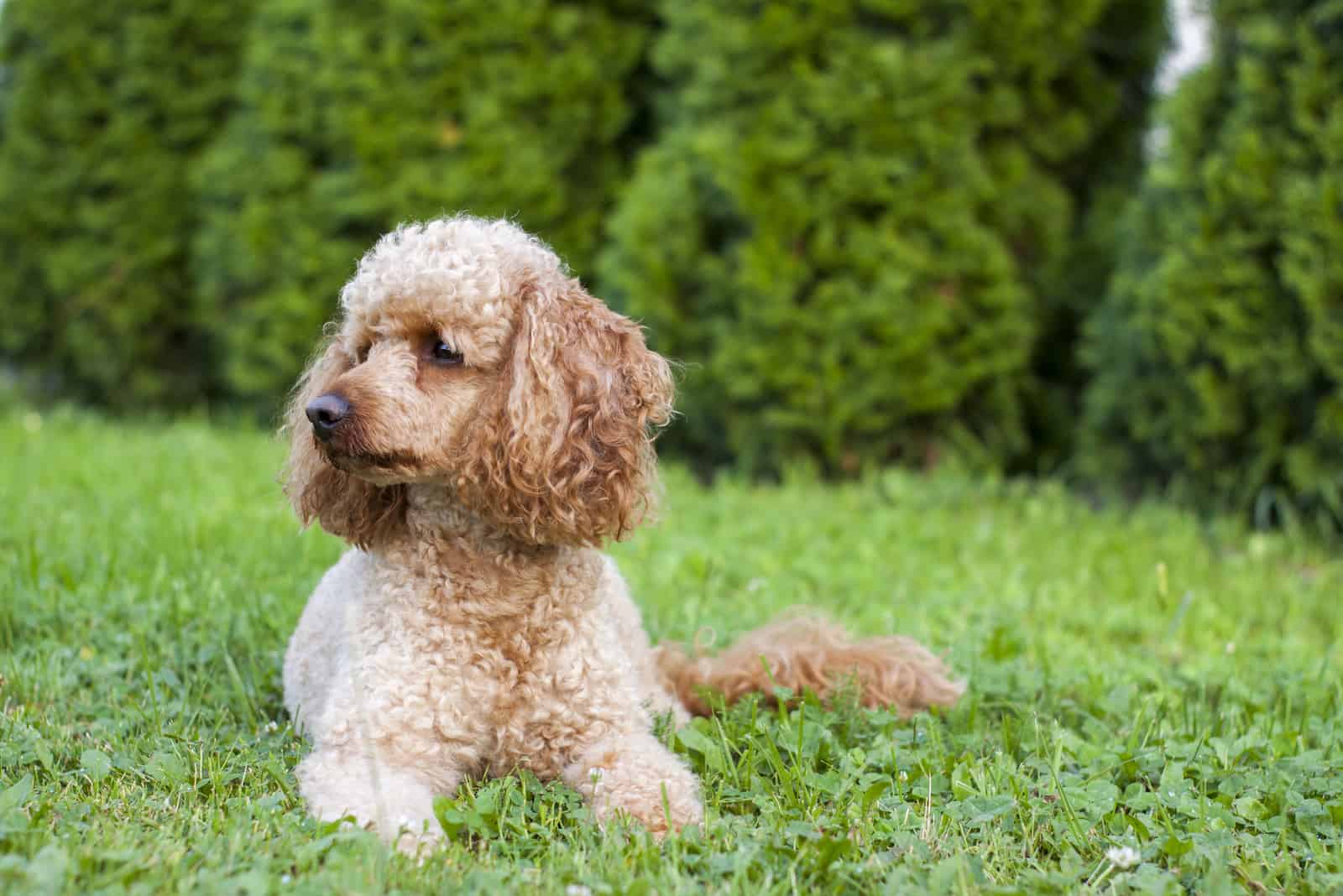
The soft and curly Poodle hair comes with a unique set of health problems you need to consider before adopting a Poodle puppy. Poodles are high-maintenance dogs. Their coats have some common issues that affect the entire breed.
Health problems that can affect your Poodle’s coat include:
1. Hair Loss
The first sign of health issues is hair loss. The hair may or may not grow back with time. As a rule, male Poodles lose hair in their groin area after castration. This hair loss can sometimes spread to the dog’s trunk. A genetic illness called sebaceous adenitis also causes hair thinning, hair loss, and scaly skin.
2. Poodle Coat Thinning and Bald Spots
With age or pregnancy, female Poodles develop hair loss problems based on their hormone fluctuations. Their coats can thin out so much that you can see the skin. Matted and tangled hair can also cause Poodles to bite and pick at their hair, pulling them out and leaving bald spots. These bald spots can be caused by numerous health problems, including:
• fleas
• poor grooming
3. Red Mange and General Poodle Allergies
Poodles are very sensitive to foods and shampoos, which can cause your dog to scratch their skin until the coat begins to thin. Also, there are mites that live on all dogs, but Poodles can have an allergic reaction to these small pests, which is called red mange. Allergies can cause a number of reactions, including:
• itching
• biting
• hair loss
4. Hypothyroidism in Poodles
Hypothyroidism is a hormonal imbalance that can cause a wide variety of reactions in Poodles. Some poodles that develop hypothyroidism lose their curls and develop an extremely thick coat. Lethargy, slow reactions, and refusing to walk are symptoms of hypothyroidism.
How To Groom A Blue Standard Poodle
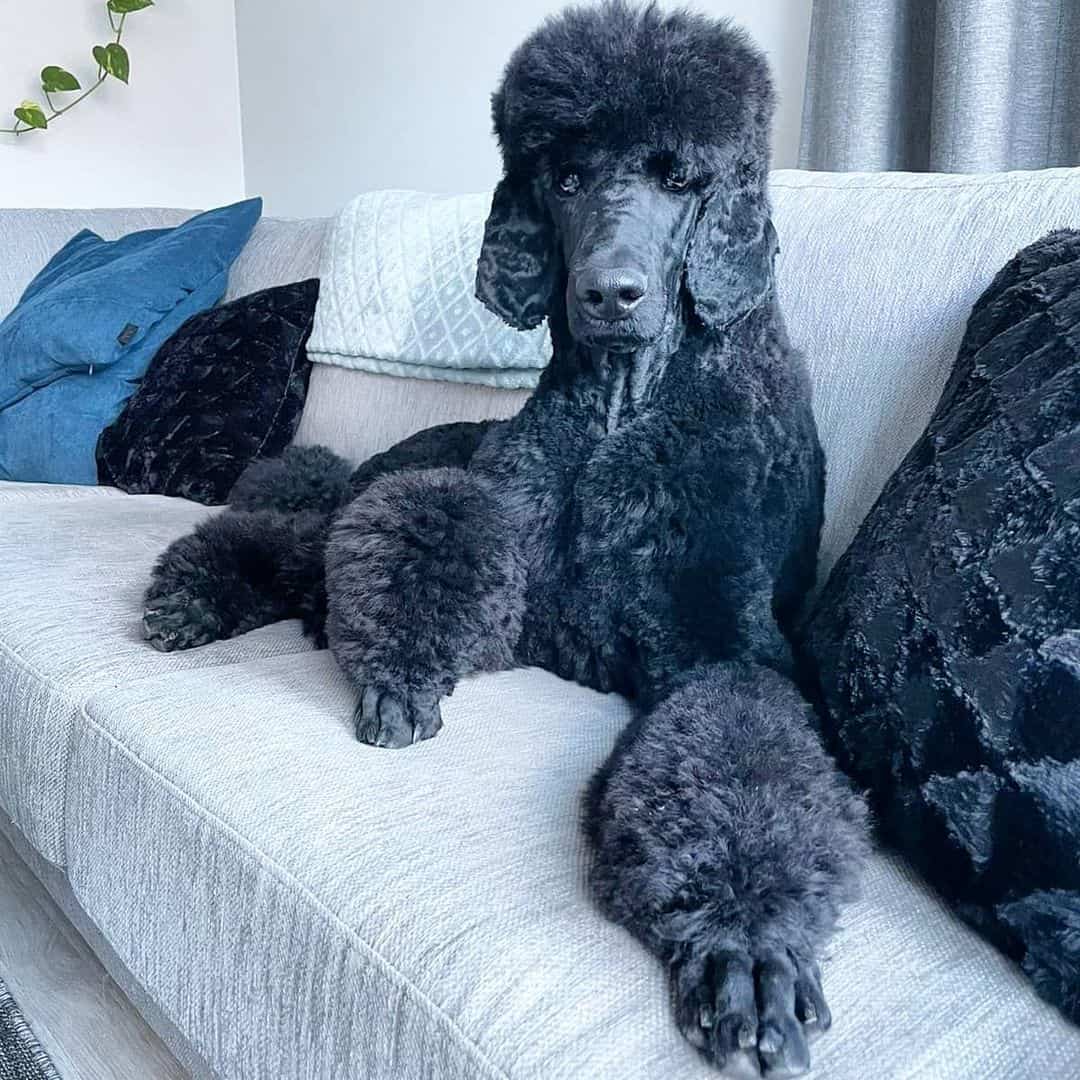
Photo from: @dancefloorsstandardpoodles
If you have never groomed a blue Poodle before, then it’s very important to educate yourself on the basics of grooming.
Poodles need to be groomed on a regular basis to keep the coat in good condition. No matter how well-behaved your Poodle is, no matter how nice a personality it has, if it’s not properly groomed, that Poodle will start looking a bit shabby, and there’s nothing sadder than a shabby Poodle.
Compared to other dog breeds, Poodles need a lot of grooming because their hair grows fast, and it’s difficult to control.
Thankfully, the process of Poodle grooming is not a difficult one. You will need basic grooming tools like a brush, shampoo, comb, and nail clippers.
You might even take your pooch to a groomer to give him some of the best Poodle haircuts – click here if you’d like to get inspired!
Blue Poodle Name Ideas
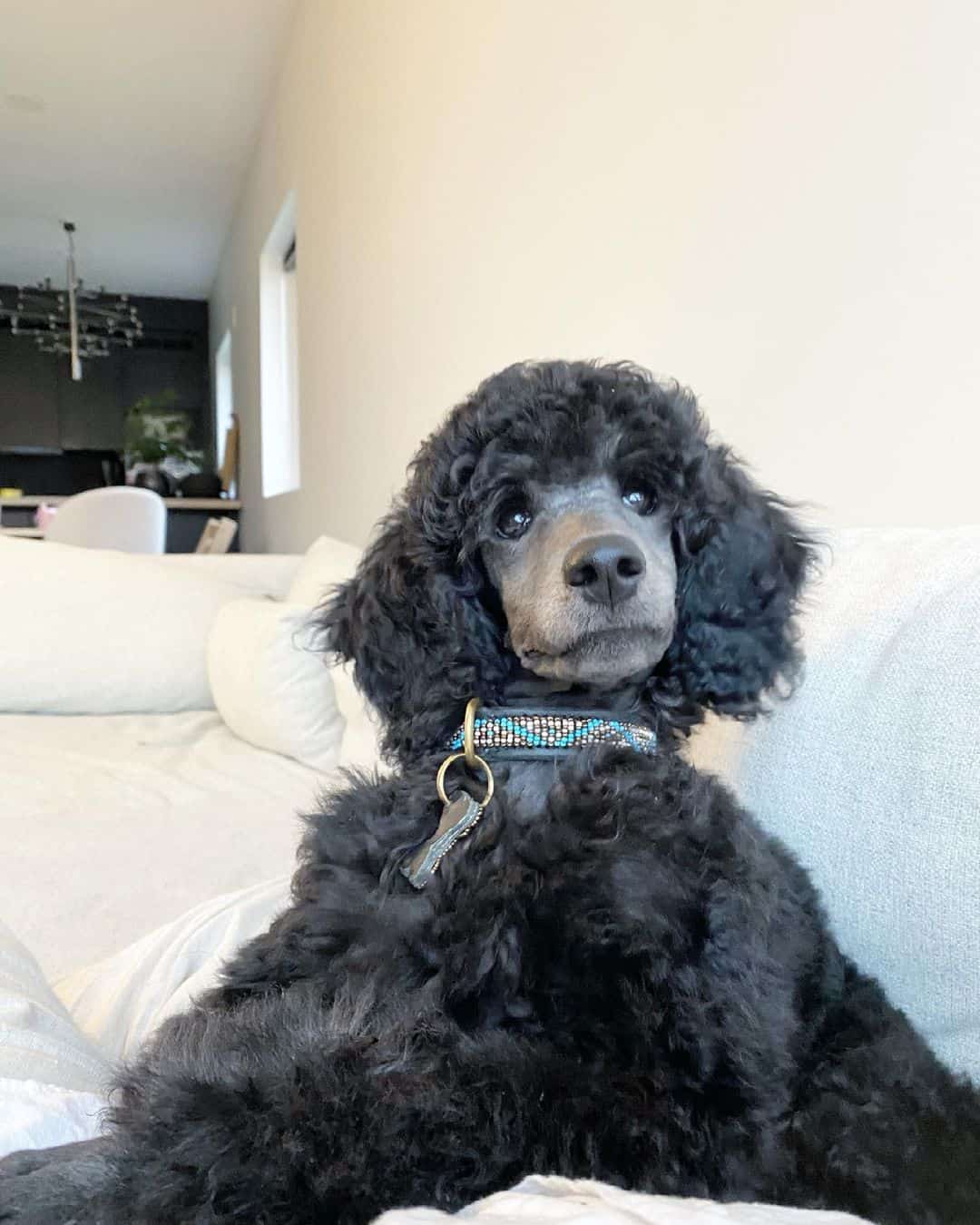
Photo from: @minken.poodle
If you’re looking for the ideal name for your blue Poodle, we’ve got you covered. Here’s a list of the coolest dog name ideas your blue Poodle puppy can carry around with pride.
Naming your new dog is one of the best parts of getting a new buddy.
Let’s take a peek and see if Fido suits your blue Poodle or if Bleu is a much better idea!
• Aster
• Iris
• Blue star
• Salvia
• Bluebell
• Veronica
• Indigo
• Sweet pea
For those of you who don’t gravitate towards these floral names, here are some more unique ones, usually meaning the color blue.
• Aeluin (a blue lake)
• Afina (Hebrew for a female deer)
• Aoki (an evergreen blue tree)
• Azul (another name for blue)
• Bleu (French for blue)
• Doli (bluebird)
• Jey (blue crested bird)
• Livie (olive tree)
These are just some of the names you can choose from. If you still haven’t found your dog’s name, then click here and scroll through our ultimate list of dog names!
Final Words
Now that you know why blue Poodles are so special, will you consider getting one as your family pet and lifelong companion? Blue Poodles are showstoppers. Once you get your blue Poodle puppy out to the dog park, you’ll only receive the best of compliments.
Read Next: The Best 7 Poodle Breeders In New York
